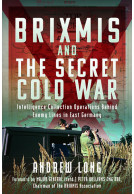Secrets of the Cold War (ePub)
Espionage and Intelligence Operations - From Both Sides of the Iron Curtain
Imprint: Pen & Sword History
File Size: 91.4 MB (.epub)
Pages: 288
ISBN: 9781526790262
Published: 11th November 2022
| Other formats available - Buy the Hardback and get the eBook for £1.99! | Price |
|---|---|
| Secrets of the Cold War Hardback Add to Basket | £25.00 |
The Cold War, which lasted from the end of the Second World War to the collapse of the Soviet Union in 1991, was fought mostly in the shadows, with the superpowers manoeuvring for strategic advantage in an anticipated global armed confrontation that thankfully never happened.
How did the intelligence organisations of the major world powers go about their work? What advantages were they looking for? Did they succeed?
By examining some of the famous, infamous, or lesser-known intelligence operations from both sides of the Iron Curtain, this book explains how the superpowers went about gathering intelligence on each other, examines the type of information they were looking for, what they did with it, and how it enabled them to stay one step ahead of the opposition. Possession of these secrets threatened a Third World War, but also helped keep the peace for more than four decades.
With access to previously unreleased material, the author explores how the intelligence organisations, both civilian and military, took advantage of rapid developments in technology, and how they adapted to the changing threat. The book describes the epic scale of some of these operations, the surprising connections between them, and how they contributed to a complex multi-layered intelligence jigsaw which drove decision making at the highest level.
On top of all the tradecraft, gadgets and ‘cloak and dagger’, the book also looks at the human side of espionage: their ideologies and motivations, the winners and losers, and the immense courage and frequent betrayal of those whose lives were touched by the Secrets of the Cold War.
“Even though Long’s main audience is certainly meant to be intelligence studies scholars and intelligence practitioners, and scholars and students of military, Soviet, American, British, and Cold War histories, Long’s careful explanations of terms and notions makes his book accessible, informative, and enlightening to ordinary readers who have no training in the aforementioned disciplines.”
International Journal of Intelligence and CounterIntelligence.
"... a meticulous study of intelligence studies... will be enlightening for those who want to know more about espionage and sophisticated intelligence designs..."
International Journal of Intelligence and Counterintelligence
"Mr. Long is a clear writer, and his research is impressive: the selected bibliography is thorough."
The NYMAS Review
These are real stories. I am sure some readers of my age will be fascinated by the extra detail, while younger readers may enjoy discovering more of the real stories that have inspired so many novels.
Military Model Scene
Read the full review here
5 out of 5
Army Rumour Service (ARRSE)
Altogether an entertaining and well-written book
Read the Full Review Here
As featured on Beating Tsundoku
Beating Tsundoku
Secrecy, espionage, betrayal, technology, and subterfuge are all words used to describe intelligence operations during the Cold War and Andrew Long has pieced together a very comprehensive and well researched volume on espionage, intelligence gathering, and the classic art of spying during the Cold War. There are stories of spy rings both in the USA and the UK, codebreaking, listening devices, double agents, and more.
Todd Shugart - Aviation News
The first three chapters focus on the post World War Two period up to the 1960s but really begins with the birth of Communism and in particular the early Soviet efforts in the 1930s to penetrate Great Britain and the United States of America. The key secrets being sought were political, military, industrial, scientific, technological, and economic ones. The introduction lays some groundwork with the reader explaining the history of Soviet intelligence or security units such as the NKVD, the KGB, and the GRU all of which play central roles in intelligence and counter-intelligence operations described in the book. Project VENONA is just one operation that is described in fascinating detail where the US Army Security Agency was able to break into the Soviet diplomatic code system beginning in 1943. It soon became apparent that Stalin’s spies had penetrated every section of Roosevelt’s government and the Manhattan Project which was the program working on atomic weapons. The UK Atomic Energy Research Establishment employed a man by the name of Klaus Fuchs who was a Soviet spy. Kim Philby a very famous British citizen and Soviet spy was also supplying information to Moscow in an effort to cover for Soviet spies whose cover had been blown. The “Cambridge Five” and the “Portland Ring spy ring which involved information on UK submarine technology are also covered in this book. What is readily apparent is that spying on both sides was rampant throughout the 1940s on into the 1980s! One of the more fascinating tales is that of the Berlin Tunnel which was a 450 metre long tunnel going from a warehouse in West Berlin through the border to East Berlin where there was a critical junction of underground communication cables that carried Soviet military phone lines. This tunnel was used to tap the cables underground. And yet a spy named George Blake who had been a prisoner of the North Koreans had already alerted the Soviets to this project before it was even started. However, the Soviets chose to let it happen and didn’t even warn their generals in Berlin to stop saying classified information over the phones. This was in an effort to not expose George Blake as they believed he was even more valuable then the information the West was gleaning from the tap. But it was “discovered” on a fake inspection by the East Germans after months of information had been recovered. This is just another example of the incredible secrets that Andrew Long has uncovered for the reader.
The last third of the book is dedicated to the British Commander-in-Chief’s to the Soviet Forces of Occupation in Germany or BRIXMIS program as it was commonly known as. This was a development of the Robertson-Malinin Agreement that both sides would allow teams of “inspectors” to tour around each other’s areas of control. This operation allowed selected British military personnel to travel around East Germany with supposedly unhindered access but what Andrew explains is that certain areas were more restricted than others and there were many incidents of intentional ramming of vehicles, violence, and harassment of the BRIXMIS team members. It is a fascinating story of an operation that went on 365 days a year till 10 December 1990. The conclusion of the book is brilliantly laid out for the reader, uncovering what became of most of the prominent spies and spy rings. Some end up in prison, some died mysteriously, and some were never caught and lived out their lives peacefully.
The book is lavishly illustrated throughout the book with photos of key operatives and complex networks along with maps, diagrams, and organisational charts. There is a 16-page colour photo section that includes profile artwork, maps, and badges. The extensive endnote section is just but one example of the deep level of research undertaken by the author. The eight appendices include tables of project sites, defections, arrests, convictions, and codewords. There are also specifications of the de Havilland Chipmunk and the Hunting Percival Pembroke aircraft, a BRIXMIS Compement ORBAT and a history of No. 60 Squadron Royal Air Force. There is a bibliography that includes books, journals, and web sources. And finally there is a very useful index that comes in handy when cross referencing agent names for example. This is an outstanding effort by a dedicated and meticulous author who shines a light on the dark shadows of Cold War espionage from both sides. I highly recommend this book to anyone with an interest in intelligence operations, the Cold War, and the intriguing but secretive world of superpower espionage.
If you are interested in spies, the Cold War or the modern history of Germany you can't really go wrong in picking up this book.
Iron Mammoth's Studio
Highly Recommended!
Read the Full Review Here
It does serve as a good introduction to the topic for those who are interested in the Cold War and espionage. I can see this being of interest to lots of researchers, wargammers and authors.
Medieval Sword School
Read the Full Review Here
It does serve as a good introduction to the topic for those who are interested in the Cold War and espionage. I can see this being of interest to lots of researchers, wargammers and authors.
Military Model Scene
Read the Full Review Here
It has really made me want to look at a part of history I didn't know much about.
NetGalley, Karl Wardlaw
Rating: 5 out of 5 stars
NetGalley, David Fleshbourne
Excellent work, I already knew about some espionage in the cold war, this book made me aware of others I did not know about.
A really good read which explains the workings of the KGB and forerunners. It covers Russian infiltration of the Manhattan project, the Portland spy ring, George Blake and others. It also describes how the networks worked and what happened to the people involved in the espionage.
If you are interested in the Cold war and espionage, this is an informative book to read, it is not a in depth detailed textbook and if you wish to look into an episode in depth there are other books, but as a brief overview and taster it is excellent.
Highly readable, I will read more from Andrew Long.
This is a comprehensive historical account that appears to cover everything it needs to and more.
NetGalley, Rebecca Sims
I found it engaging and informative and would recommend it to anyone who wants to expand their knowledge of the Cold War.
The first half of this book was a detailed and intriguing account of the atomic spies, such as Fuchs, and other traitors, as well as wonderfully brave spies who made great sacrifices to spy on the Soviet Union, such as Greville Wynne. There were also exciting stories about defectors. I found the lack of security and the reliance on upper-class men, such as Philby, being trustworthy because they were 'gentleman' absolutely amazing. I knew about this before, of course, but this book really brings it home to readers. I also liked the descriptions of the James Bond-ish equipment that the spies used, such as the tiny mini-cameras. Some would use these extremely quickly, while their boss was nearby!
NetGalley, Lisa Sanderson
About Andrew Long
Andrew Long is a Cold War historian and author. His fascination with the Cold War began with a trip to East Berlin in 1986, travelling through the famous Checkpoint CHARLIE. Andrew's writing comes from a desire to make sense of an extremely complex period in modern history, weaving together inter-relating stories involving politics, ideologies, personalities, intelligence, technological advances, and geography. There is still much to be told on this fascinating subject. After a successful career in marketing, Andrew relocated to Cornwall and took up writing full time. This is Andrew’s fourth book, with the first three volumes of a miniseries on Cold War Berlin published by Helion & Company in 2021/22.
















